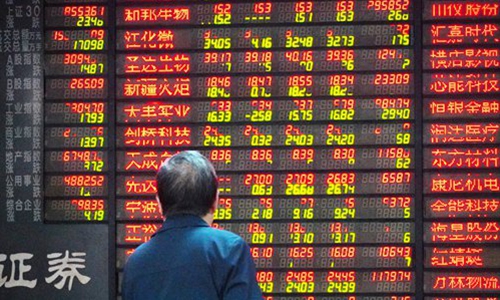HOME >> SOURCE,SPECIAL-COVERAGE
Speculative short-sellers won't defeat China's preparations amid epidemic
Source:Global Times Published: 2020/2/12 21:48:40

File photo
The outbreak of novel coronavirus pneumonia (COVID-19) in China may exacerbate financial market turmoil as signs of a potential financial war emerge, with some speculative forces poised to work against the world's second largest economy.
There is no denying the current epidemic will inflict some pain on the Chinese economy in the short term, but that should not become an opportunity for some to attack China's financial market by maliciously spreading panic among investors. For instance, in a recent interview with Institutional Investor, longtime China critic Kyle Bass of Hayman Capital Management predicted "a double-digit GDP decline" for the Chinese economy as a result of the COVID-19 outbreak.
International speculators have in fact played a role in triggering or exacerbating many economic crises through history. They often inflated crises and created panic through fear-mongering comments, so as to utilize public anxiety to reap huge gains. China needs to be wary of these speculative forces and their "China collapse" rhetoric, because financial market turmoil may cause even more damage to the country's economy than the COVID-19 outbreak.
Such attacks often occur in unexpected ways, but are not easily successful. As China is already alert and prepared, speculative short-sellers won't get a good deal.
For starters, the mainland A-share market is not yet fully open and Chinese financial regulators have suspended short-selling activities to prevent volatility, so the probability of shorting China's stock market is not high.
However, in the offshore market, it is still possible that some speculative forces may deliberately spread fear of the epidemic, causing panic among investors and putting pressure on the offshore yuan rate. While China has ample foreign exchange reserves to stabilize its offshore market, it still needs to proceed with caution to prevent risks spreading from overseas currency markets to domestic financial markets. As of the end of January, China's foreign exchange reserves had expanded slightly to $3.12 trillion.
Due to the impact of the COVID-19 outbreak on the Chinese economy, demand for commodities is expected to shrink in the short term, and has led to a recent continuous decline in prices of global commodities like oil and copper. Both Brent crude and West Texas Intermediate crude oil prices have dropped by more than 20 percent since early January.
It should be noted that China's large-scale, state-owned enterprises should remain vigilant to avoid becoming a potential target of international speculators, particularly when it comes to overseas hedge contracts. In the past, Sinopec and China Aviation Oil (Singapore) have both suffered heavy losses in oil derivatives trading.
State-owned enterprises engaged in overseas derivatives trading should strengthen the management of their risk control systems, eliminating any inappropriate or risky strategies. Relevant state-owned asset supervision authorities should also conduct risk checks on transactions of derivatives by state-owned enterprises on a regular basis.
Posted in: GT VOICE